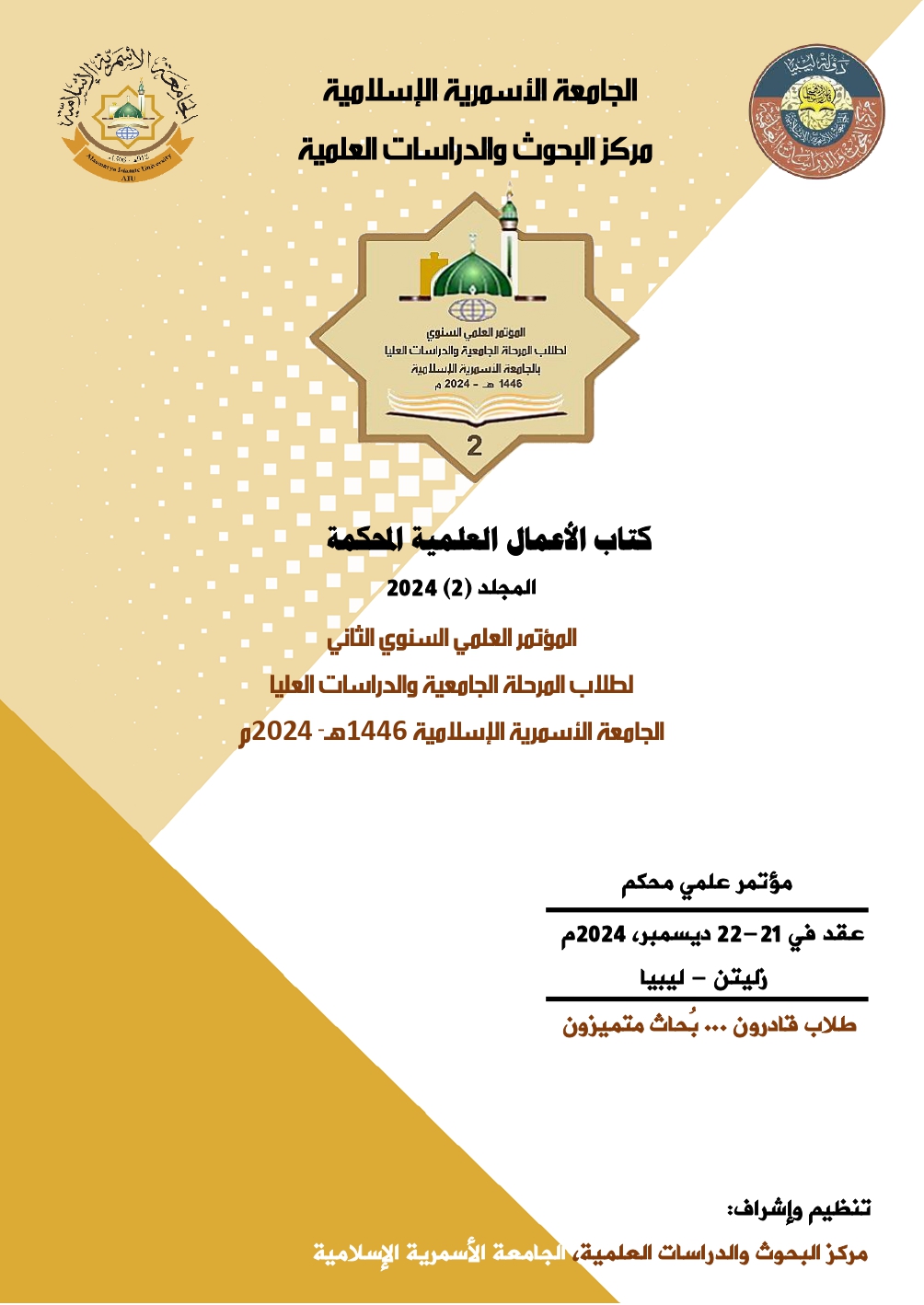تأثير اللغة الأم والترجمة على استيعاب وفهم النصوص المكتوبة
الكلمات المفتاحية:
الفهم القرائي، الترجمة، اللغة الأمالملخص
تعتمد مهارات الفهم القرائي بشكل كبير على الدراسة الذاتية للمتعلمين. تهدف هذه الدراسة إلى تحديد الأسباب وراء التحديات التي يواجهها المتعلمون، وخاصة تأثير لغتهم الأم واستخدام الترجمة في فهم النصوص المكتوبة. سعت الدراسة إلى تحديد المشاكل والفجوات في استراتيجيات الفهم القرائي، ومعالجة نقص التقنيات الفعالة للترجمة، وتزويد المتعلمين بأساليب لتقليل تأثير لغتهم الأم عند تعلم لغة ثانية. تم توزيع استبيان على عينة من 52 طالبة ليبية تدرس اللغة الإنجليزية كلغة أجنبية في الجامعة الأسمرية الإسلامية في كلية العلوم الإنسانية للبنات، تتراوح أعمارهن بين 22 و26 عامًا، وكن في الفصلين السابع والثامن. بالإضافة إلى ذلك، تم إجراء مقابلات مع أربعة معلمين للغة الإنجليزية من الكلية. أشارت النتائج إلى عدة أسباب تجعل الطلاب يواجهون صعوبة في فهم النصوص المكتوبة بشكل فعال. تشمل هذه الأسباب: نقص الممارسة في استراتيجيات القراءة في المنزل، إهمال استخدام استراتيجيات الفهم القرائي، عدم اتخاذ المبادرة في تحسين مهارات القراءة، رؤية تعلم اللغة الإنجليزية مجرد وسيلة للحصول على الشهادات والدرجات، عدم الانغماس بعمق في اللغة، عدم التوجه نحو التعلم الأكاديمي من خلال استخدام المواقع والتطبيقات المتاحة، وعدم التفكير في مستقبلهم كمعلمين.
التنزيلات
المراجع
Abu Abeeleh, T. W., Al-Ghazo, A., & Al-Sobh, M. (2021). Reading comprehension problems encountered by EFL students at Ajloun National University. International Journal of Language and Linguistics, 8(1), 6-15.
Al-Ashhab, O. S., & Lakshmi. (2013). Learn to teach, 2nd ed. Ehmouda for publishing.
Al-Jarrah, H., & Ismail, N. S. B. (2018). Reading comprehension difficulties among EFL learners in higher learning institutions. International Journal of English Linguistics, 8(7), 32-41.
Bardos, J. (2000). The theory and practice of foreign language teaching. Nemzeti Tankonyvkiado.
Barfield, A. (1999). In other words: how learners construct reading difficulties. Literacy across Cultures.
Brown, H. D. (2007). Teaching by principles: An interactive approach to language pedagogy. Pearson Education.
Catford, J. C. (1978). A linguistic theory of translation: An essay in applied linguistics, 5th ed. Oxford University Press.
Dennis, D. V. (2008). Are assessment data really driving middle school reading instruction? What we can learn from one student’s experience. Journal of Adolescent and Adult Literacy, 51(7), 578-587.
Dole, J. A., Duffy, G. G., Roehler, L. R., & Pearson, P. D. (1991). Moving from the old to the new: Research on reading comprehension instruction. Review of Educational Research, 61(2), 239-264.
Duarte, N., & Barner, V. (2005). Reading comprehension in teaching English as a foreign language. Monografias.
Farahani, M. V., & Siyyari, M. (2015). The effect of teaching reading comprehension skills on translation quality of Iranian EFL learners. International Journal of Applied Linguistics and English Literature, 4(1), 50-59.
Freeman, D. L., & Long, M. H. (1990). An introduction to second language acquisition research. Longman.
Hollowell, K. (2013). Factors affecting poor reading comprehension skills. eHow Contributor. On line magazine.
Karshen, S., & Brown, C. L. (2007). What academic language proficiency? STETS Language and Communication Review, 6(1), 1-4.
Lexico. (n.d.). Language transfer. Available online at [ https://www.lexico.com/definition/language_transfer].
Macmillan Dictionary. (n.d.). Available online at [https://www.macmillandictionary.com/dictionary/british].
McCormick, K. (1994). The culture of reading and the teaching of English. Manchester University Press.
McDonough, J., & Shaw, C. (1993). Materials and methods in ELT. Blackwell.
Merriam-Webster (n.d.). Interference. Available online at [https://www.merriam-webster.com/dictionary/interference]
Nagy, W. E., & Scott, J. (2000). Vocabulary processes. In: Handbook of reading research, M. Kamil, P. Mosenthal, P. D. Pearson, & R. Barr (Eds.), 3, pp. 269-284, Mahwah, NJ: Erlbaum.
Newmark, P. (1988). A textbook of translation. Prentice Hall.
Nourinezhad, S., & Kashefian-Naeeini, S. (2020). Iranian EFL university learners and lecturers’ attitude towards translation as a tool in reading comprehension considering background variables of age, major and years of experience. Cogent Education, 7(1), 1746104.
Nozen, S. Z., Kalajahi, S. A. R., Abdullah, A. N., & Jabbarzadeh, H. (2017). An investigation of the impacts of teaching writing skills through extensive short story reading. Journal of Nusantara Studies, 2(1), 53-70.
Nuttall, C. (2000). Teaching reading skills in a foreign language. Macmillan.
Oxford Owl. (n.d.). Available online at [https://www.oxfordowl.co.uk].
Pressley, M. (2002). Reading instruction that works: The case for balanced teaching, 2nd ed. Guilford Press.
Reading Horizons (n.d.). What’s the difference between ESL, EFL, ESOL, ELL, MLL, and ESP? Available online at [https://www.readinghorizons.com/blog/what-s-the-difference-between-esl-efl-esol-ell-and-esp].
Rumelhart, D. E. (2017). Schemata: The building blocks of cognition. In Theoretical issues in reading comprehension. Routledge..
Sayer, I. M. (2013). Misunderstanding and language comprehension. Procedia-Social and Behavioral Sciences, 70, 738-748.
Snow, C. E., Burns, M. S., & Griffin, P. (1998). Preventing reading difficulties in young children. National Academy Press.
Vacca, R. T. (2002). Making a difference in adolescents’ school lives: Visible and invisible aspects of content area reading. In: What research has to say about reading instruction, A. E. Farstrup & S. J. Samuels (Eds.), pp. 95-111. Lawrence Erlbaum Associates.
Vannestål, M. (2009). Linguistic interference in translated academic texts: A case study of Portuguese interference in abstracts translated into English. Master's thesis, Vaxjo University.
Yadav, M. K. (2014). Role of mother tongue in second language learning. International Journal of research, 1(11), 572-582.
Zhang, L. J. (2001). Awareness in reading: EFL students' metacognitive knowledge of reading strategies in an acquisition-poor environment. Language Awareness, 10(4), 268-288.
التنزيلات
منشور
إصدار
القسم
الرخصة

هذا العمل مرخص بموجب Creative Commons Attribution-NonCommercial-NoDerivatives 4.0 International License.





